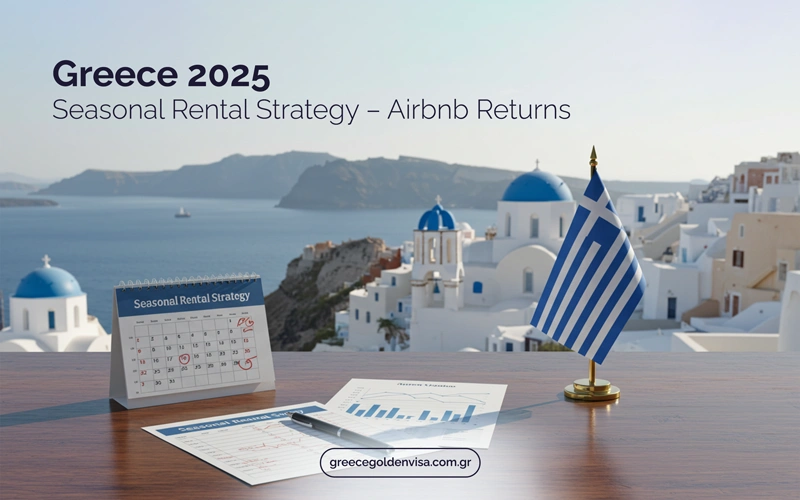As of August 7, 2025, the height of the Greek tourism season, the potential of your Golden Visa property as a high-yield asset is at its peak. However, in the sophisticated and competitive short-term rental market, achieving premier returns is no longer a passive exercise.
Simply listing your property on Airbnb is not a strategy; it is an invitation for mediocrity. To truly maximize your annual income, you must operate with the mindset of a professional hospitality manager, employing a dynamic, data-driven seasonal strategy that adapts to the distinct rhythms of the Greek tourism calendar.
This guide provides a definitive framework for maximizing your Airbnb returns in 2025. We will move beyond basic hosting tips to introduce professional yield management concepts and provide a detailed, season-by-season playbook for pricing, marketing, and guest experience.
This is the blueprint for transforming your Greek property from a static real estate holding into a dynamic, high-performance business asset that significantly enhances the overall ROI of your Golden Visa investment.
The High-Yield Host’s Brief: Key Optimization Tactics
- Adopt a Three-Season Strategy: Your pricing and marketing must adapt to the realities of Peak Season (July-Aug), Shoulder Seasons (May-June & Sept-Oct), and the Off-Season (Nov-April).
- Embrace Dynamic Pricing: Fixed nightly rates are obsolete. Use professional yield management tools (e.g., PriceLabs, Wheelhouse) to automatically adjust your prices based on demand, seasonality, local events, and competitor pricing.
- Invest in “Digital Kerb Appeal”: Professional photography is the single most important investment you can make. It is the primary driver of clicks, bookings, and the ability to command a premium price.
- Sell an Experience, Not Just a Room: In a crowded market, 5-star reviews are gold. Curate a memorable guest experience with thoughtful amenities, local recommendations, and seamless communication to achieve and maintain “Superhost” status.
- Optimize Your Listing for Search: Treat your Airbnb listing like a strategic webpage. A keyword-rich title, detailed descriptions, and a fully utilized amenities checklist are crucial for visibility.
Understanding Greek Tourism Seasonality: The Foundation of Your Strategy
The Greek rental market is defined by its distinct seasons. A uniform, year-round strategy will fail, leaving money on the table during high season and suffering from extended vacancies in the low season.
- Peak Season (approx. July 1 – August 31): Demand far outstrips supply. The strategic goal is price maximization.
- Shoulder Seasons (approx. May 1 – June 30 & September 1 – October 31): Demand is strong but more price-sensitive. The strategic goal is driving high occupancy at competitive rates.
- Off-Season (approx. November 1 – April 30): Tourist demand is low (outside of Athens city breaks). The strategic goal is securing long-stay tenants like digital nomads or covering fixed costs.
The Three-Season Strategy for Maximizing Annual Revenue
Strategy 1: The Peak Season (July-August) – Price Maximization
During these eight weeks, your property should generate a disproportionately large share of its annual income.
- Pricing: This is the time for premium pricing. Set your base rate high and let your dynamic pricing tool push it even higher for weekends and key holiday dates (like the August 15th public holiday). Minimum stays should be extended to 5-7 nights to maximize revenue per booking and reduce turnover costs.
- Marketing: Focus on what makes your property a premium summer experience: the view, the pool, the proximity to the beach, the air conditioning.
- Operations: This is an all-hands-on-deck period. Your cleaning and maintenance teams must be highly reliable to handle rapid back-to-back turnovers.
Strategy 2: The Shoulder Seasons (May-June & Sept-Oct) – Occupancy Driving
The weather is still fantastic, but the crowds are smaller and travelers are more budget-conscious.
- Pricing: Your base rate should be lowered from the peak season peak. Offer slight discounts for longer stays (e.g., 10% off for a week-long booking) to incentivize higher occupancy. Reduce minimum stays to 2-3 nights to capture weekend travelers.
- Marketing: Target couples, remote workers, and cultural tourists. Highlight local festivals, hiking opportunities, and the pleasant weather. This is a great time to run targeted promotions.
Strategy 3: The Off-Season (Nov-April) – Creative Revenue Streams
For island properties, the goal is often to simply cover costs. For city properties (especially Athens), there is still opportunity.
- Pricing: Drastically reduce nightly rates. The primary strategy is to offer significant discounts (50-60%+) for monthly stays to attract digital nomads, researchers, or corporate relocations.
- Marketing: Update your listing title to “Monthly Stays Welcome | High-Speed Wifi.” Highlight amenities crucial for long-term living: a fully equipped kitchen, a dedicated workspace, a washing machine.
- Operations: This is the ideal time to schedule non-urgent maintenance, renovations, and deep cleaning.
The Art & Science of Dynamic Pricing
Static pricing is the enemy of profit. Yield management is the practice of continuously adjusting your price to sell your inventory (your available nights) at the best possible price at any given moment.
- Use Professional Tools: Subscribe to a dynamic pricing service like PriceLabs or Wheelhouse. These tools analyze billions of data points—including flight bookings, hotel rates, competitor pricing, and local events—to update your calendar with optimized pricing daily. The monthly fee for these services is negligible compared to the uplift in revenue they generate.
- Set Your Strategy: Within these tools, you set the parameters: your base price, minimum price, and how aggressively you want to price. This combination of AI-driven data and your human strategy is key.
Optimizing Your Digital Storefront: The Perfect Airbnb Listing
Your Airbnb listing is your most important sales tool. It must be flawless.
- Professional Photography and Staging: Before you do anything else, hire a professional interior and architectural photographer. A €300-€500 investment in photos can increase your annual revenue by 20-40%. Stage the property with fresh flowers, a bowl of fruit, and high-quality linens for the photoshoot.
- Crafting a Compelling Title and Description: Your title should be descriptive and include key selling points (e.g., “Cycladic Villa with Infinity Pool & Sunset Views” is better than “Nice House in Mykonos”). The description should tell a story, helping the guest imagine themselves enjoying the space.
- Leveraging Reviews to Build Trust: Actively solicit reviews from happy guests. Respond publicly to all reviews, both positive and negative, in a professional manner. Achieving and maintaining “Superhost” status provides a significant boost in search visibility and guest trust.
The Path Forward: From Property Owner to Professional Host
The difference between an average Airbnb host and a top-performing one lies in strategy, data, and a commitment to excellence. By adopting a professional, seasonal approach, you can ensure your Greek property not only fulfills its role in your Golden Visa journey but also becomes a powerful and profitable addition to your global investment portfolio.
Implementing a professional seasonal strategy can be complex. To connect with our preferred partners in dynamic pricing and short-term rental management, we invite you to schedule a consultation on your property’s performance.
The Airbnb Investor’s Frequently Asked Questions (FAQs)
- What are the most important amenities to offer in a Greek rental? For the summer, high-performance air conditioning is non-negotiable. High-speed, reliable Wi-Fi is now a baseline expectation year-round. Other high-impact amenities include a Nespresso machine, high-quality linens and towels, a washing machine, and a well-equipped kitchen. For luxury properties, a private pool or hot tub can dramatically increase the achievable nightly rate.
- Is it worth it to aim for Airbnb’s “Superhost” status? Yes, 100%. Superhosts receive preferential placement in search results, a special badge on their listing that builds trust, and access to dedicated Airbnb support. The criteria (high response rate, low cancellation rate, high overall rating) are simply the hallmarks of running a professional operation.
- How do I handle negative reviews? Respond quickly, publicly, and professionally. Never be defensive. Acknowledge the guest’s feedback, apologize for any shortcomings, and briefly state what you have done to rectify the issue for future guests. A thoughtful response to a negative review can often build more trust than a stream of generic positive ones.
- Should I list on other platforms besides Airbnb, like VRBO or Booking.com? Yes. To maximize occupancy, especially in the shoulder and off-seasons, you should be listed on the top 2-3 platforms. A professional property manager will use a “channel manager” tool to synchronize your calendars across all platforms automatically, preventing double bookings.
- How much should I budget annually for supplies and minor maintenance? A good rule of thumb is to budget 5-10% of your gross annual rental income for recurring supplies (coffee, toiletries, cleaning products), linens replacement, and minor maintenance (e.g., a broken faucet, paint touch-ups).
 Greece — +30 698 557 8998
Greece — +30 698 557 8998
 Turkey — +90 506 022 30 00
Turkey — +90 506 022 30 00
 UAE — +971 52 913 5599
UAE — +971 52 913 5599
 Egypt — +20 110 114 9411
Egypt — +20 110 114 9411





